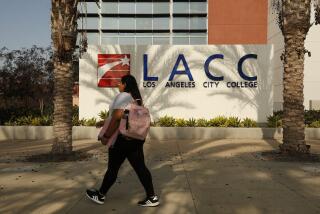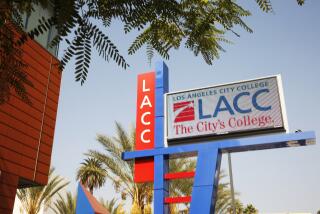Capitol Journal: When it comes to affordable college education, conservative Tennessee has so-called progressive California beat
California’s Democratic politicians and activists talk big about being so-called progressives. But on one thing, they’re downright reactionary when compared with hard-right Tennessee.
Tennesseans voted in landslide numbers — roughly 61% of them — for President Trump. They’re also about to provide a tuition-free community college education for any Tennessean who wants one. That’s truly progressive’.
Californians voted in a landslide — nearly 62% — for Hillary Clinton. And for decades the state has been marching backward on affordable college education. We’re not really as progressive as many shouting leftists would like to think.
Before 1984, California charged no community college fees. Then the Legislature authorized $5 per unit. Tha has risen gradually and is now at $46. Take 15 units a semester and the tab’s $1,380 per school year. Yes, that’s a bargain, but it’s also a hard reach for many poor people.
The fees are waived for roughly half the students because their family incomes are so low. But there still are costly books, supplies and perhaps housing.
No one really should have to pay a community college course fee. California managed that for decades. And Tennessee is now.
So, starting this month, is San Francisco. Community college is tuition-free for city residents, paid for by tax money.
Pending on the state Senate floor is a bill that would take a significant step toward free community college throughout California and return it to more affordable public higher educations. AB 19 would waive fees for all first-year, full-time community college students taking at least 12 units.
“Community colleges have to be free,” says the bill’s author, Assemblyman Miguel Santiago (D-Los Angeles). “There’s no reason why they’re not. If California is going to compete in the 21st century economy, we’re going to have to break down education barriers.
“We ought to do something to incentivize students to go to community college.”
Santiago, 44, attended community college at Moorpark before transferring to UCLA. He’s a past board member of the Los Angeles Community College District.
But his bill faces a tough slog to be sent to Gov. Jerry Brown before the year’s legislative session ends Friday. It’s considered a second-tier bill — the kind that becomes a leverage tool for legislative players seeking what they consider a bigger prize. “You want that, give me this!”
Moreover, Brown’s Finance Department is opposed to the measure. Although the community college system pegs the cost at around $32 million annually, Brown’s budgeters say it could hit $50 million. That’s too risky in an iffy economy, they contend.
Tennessee, however, somehow manages. And its program is a lot more liberal than Santiago’s proposal because it scrubs community college tuition for all state residents who haven’t yet earned a degree.
The Tennessee Legislature is even more Republican than California’s is Democratic. Talk about supermajorities: Tennessee’s Senate is 85% Republican and its House of Representatives is 74%.
That state’s outspoken tuition-free advocate is Republican Gov. Bill Haslam, who told legislators in his January State of the State address: “Wherever you might fall on life’s path, education beyond high school is critical to the Tennessee we can be.”
That used to be California’s philosophy too.
For generations, the Golden State charged no tuition at the University of California or state universities. Everyone benefited.
Democratic Gov. Pat Brown, Jerry’s father, often gets credit in revisionist history. Truth is, tuition-free college was created under Republican governors and legislatures.
It wasn’t just some feel-good social program. It was an investment in an economic engine that produced innovators and skilled professionals to grow California’s economy. It was in the state’s self-interest to get everyone as highly educated as they could be. It helped broaden the middle class.
What happened? Tuition crept onto campuses in the 1970s and steadily climbed. The state cut back on its higher education spending because it took on other obligations: making up for lost local property taxes because of Proposition 13, expanding costly healthcare for the poor, building more prisons.
And let’s be honest: Too many university administrators enjoy blue-plate pay and perks that didn’t exist back in the tuition-free days.
So here we are: Total tuition and fees at UC are $13,950 a year. At the state universities they’re $7,151. Then tack on room, board and books.
A full-time freshman year of community college with no fees seems a good place to start reinvesting.
In total, California has 2.1 million community college students — 900,000 enrolled full time — on 114 campuses. Many transfer to four-year universities. Many learn work skills and qualify for good-paying jobs. Many just drop out.
Several community colleges already provide some free tuition, financed with private money.
But “if current trends continue,” the Public Policy Institute of California reported last week, “California will face a large skills gap by 2030. It will be 1.1 million workers with bachelor’s degrees short of economic demand. Failing to keep up with the demand … could result in a less productive economy, lower incomes and tax revenue, and greater dependence on the social safety net.”
There’s a nonsensical argument that free tuition would benefit rich kids. But rich kids rarely choose community colleges. And creating a “means test” bureaucracy to check every student’s wallet would be fiscal foolery.
“We’re trying to go back to the future — to the programs that made sense and still make sense,” Santiago says.
They currently make sense in one Southern red state and we should follow its lead.
Follow @LATimesSkelton on Twitter
ALSO
Trump and Congress agreeing on a deal to replace DACA? Let’s hope that dream becomes a reality
School bonds used to be as controversial as mom and apple pie. Not anymore under Gov. Jerry Brown
More to Read
Get the L.A. Times Politics newsletter
Deeply reported insights into legislation, politics and policy from Sacramento, Washington and beyond. In your inbox three times per week.
You may occasionally receive promotional content from the Los Angeles Times.







